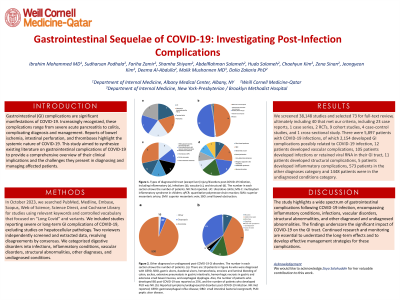Sunday Poster Session
Category: Colon
P0206 - Gastrointestinal Sequelae of COVID-19: Investigating Post-Infection Complications
Sunday, October 27, 2024
3:30 PM - 7:00 PM ET
Location: Exhibit Hall E

Has Audio
- IM
Ibrahim Mohammed, MD
Albany Medical Center
Albany, NY
Presenting Author(s)
Ibrahim Mohammed, MD1, Sudharsan Podhala, 2, Fariha Zamir, 2, Shamha Shiyam, 2, AbdelRahman Salameh, 2, Huda Salameh, 2, Chaehyun Kim, 2, Zena Sinan, 2, Jeongyeon Kim, 2, Deema Al-Abdulla, 2, Malik Mushannen, MD3, Dalia Zakaria, PhD4
1Albany Medical Center, Albany, NY; 2Weill Cornell Medicine, Doha, Ar Rayyan, Qatar; 3New York-Presbyterian / Brooklyn Methodist Hospital, Brooklyn, NY; 4Weill Cornell Medicine-Qatar, Doha, Ad Dawhah, Qatar
Introduction: Gastrointestinal (GI) complications are significant manifestations of COVID-19. Increasingly recognized, these complications range from severe acute pancreatitis to colitis, complicating diagnosis and management. Reports of bowel ischemia, intestinal perforation, and thromboses highlight the systemic nature of COVID-19. This study aimed to synthesize existing literature on gastrointestinal complications of COVID-19 to provide a comprehensive overview of their clinical implications and the challenges they present in diagnosing and managing affected patients.
Methods: In October 2023, we searched PubMed, Medline, Embase, Scopus, Web of Science, Science Direct, and Cochrane Library for studies using relevant keywords and controlled vocabulary that focused on “Long Covid” and variants. We included studies reporting severe or long-term GI complications of COVID-19, excluding studies on hepatocellular pathology. Two reviewers independently screened and extracted data, resolving disagreements by consensus. We categorized digestive disorders into infections, inflammatory conditions, vascular disorders, structural abnormalities, other diagnoses, and undiagnosed conditions.
Results: We screened 38,148 studies and selected 73 for full-text review, ultimately including 40 that met our criteria, including 23 case reports, 1 case series, 2 RCTs, 9 cohort studies, 4 case-control studies, and 1 cross-sectional study. There were 5,897 patients with COVID-19 infections, of which 2,154 developed GI complications possibly related to COVID-19 infection, 12 patients developed vascular complications, 105 patients developed infections or retained viral RNA in their GI tract, 11 patients developed structural complications, 5 patients developed inflammatory complications, 573 patients in the other diagnoses category and 1448 patients were in the undiagnosed conditions category.
Discussion: The study highlights a wide spectrum of gastrointestinal complications following COVID-19 infection, encompassing inflammatory conditions, infections, vascular disorders, structural abnormalities, and other diagnosed and undiagnosed abnormalities. The findings underscore the significant impact of COVID-19 on the GI tract. Continued research and monitoring are essential to understand the long-term effects and to develop effective management strategies for these complications.
Disclosures:
Ibrahim Mohammed, MD1, Sudharsan Podhala, 2, Fariha Zamir, 2, Shamha Shiyam, 2, AbdelRahman Salameh, 2, Huda Salameh, 2, Chaehyun Kim, 2, Zena Sinan, 2, Jeongyeon Kim, 2, Deema Al-Abdulla, 2, Malik Mushannen, MD3, Dalia Zakaria, PhD4. P0206 - Gastrointestinal Sequelae of COVID-19: Investigating Post-Infection Complications, ACG 2024 Annual Scientific Meeting Abstracts. Philadelphia, PA: American College of Gastroenterology.
1Albany Medical Center, Albany, NY; 2Weill Cornell Medicine, Doha, Ar Rayyan, Qatar; 3New York-Presbyterian / Brooklyn Methodist Hospital, Brooklyn, NY; 4Weill Cornell Medicine-Qatar, Doha, Ad Dawhah, Qatar
Introduction: Gastrointestinal (GI) complications are significant manifestations of COVID-19. Increasingly recognized, these complications range from severe acute pancreatitis to colitis, complicating diagnosis and management. Reports of bowel ischemia, intestinal perforation, and thromboses highlight the systemic nature of COVID-19. This study aimed to synthesize existing literature on gastrointestinal complications of COVID-19 to provide a comprehensive overview of their clinical implications and the challenges they present in diagnosing and managing affected patients.
Methods: In October 2023, we searched PubMed, Medline, Embase, Scopus, Web of Science, Science Direct, and Cochrane Library for studies using relevant keywords and controlled vocabulary that focused on “Long Covid” and variants. We included studies reporting severe or long-term GI complications of COVID-19, excluding studies on hepatocellular pathology. Two reviewers independently screened and extracted data, resolving disagreements by consensus. We categorized digestive disorders into infections, inflammatory conditions, vascular disorders, structural abnormalities, other diagnoses, and undiagnosed conditions.
Results: We screened 38,148 studies and selected 73 for full-text review, ultimately including 40 that met our criteria, including 23 case reports, 1 case series, 2 RCTs, 9 cohort studies, 4 case-control studies, and 1 cross-sectional study. There were 5,897 patients with COVID-19 infections, of which 2,154 developed GI complications possibly related to COVID-19 infection, 12 patients developed vascular complications, 105 patients developed infections or retained viral RNA in their GI tract, 11 patients developed structural complications, 5 patients developed inflammatory complications, 573 patients in the other diagnoses category and 1448 patients were in the undiagnosed conditions category.
Discussion: The study highlights a wide spectrum of gastrointestinal complications following COVID-19 infection, encompassing inflammatory conditions, infections, vascular disorders, structural abnormalities, and other diagnosed and undiagnosed abnormalities. The findings underscore the significant impact of COVID-19 on the GI tract. Continued research and monitoring are essential to understand the long-term effects and to develop effective management strategies for these complications.
Disclosures:
Ibrahim Mohammed indicated no relevant financial relationships.
Sudharsan Podhala indicated no relevant financial relationships.
Fariha Zamir indicated no relevant financial relationships.
Shamha Shiyam indicated no relevant financial relationships.
AbdelRahman Salameh indicated no relevant financial relationships.
Huda Salameh indicated no relevant financial relationships.
Chaehyun Kim indicated no relevant financial relationships.
Zena Sinan indicated no relevant financial relationships.
Jeongyeon Kim indicated no relevant financial relationships.
Deema Al-Abdulla indicated no relevant financial relationships.
Malik Mushannen indicated no relevant financial relationships.
Dalia Zakaria indicated no relevant financial relationships.
Ibrahim Mohammed, MD1, Sudharsan Podhala, 2, Fariha Zamir, 2, Shamha Shiyam, 2, AbdelRahman Salameh, 2, Huda Salameh, 2, Chaehyun Kim, 2, Zena Sinan, 2, Jeongyeon Kim, 2, Deema Al-Abdulla, 2, Malik Mushannen, MD3, Dalia Zakaria, PhD4. P0206 - Gastrointestinal Sequelae of COVID-19: Investigating Post-Infection Complications, ACG 2024 Annual Scientific Meeting Abstracts. Philadelphia, PA: American College of Gastroenterology.
